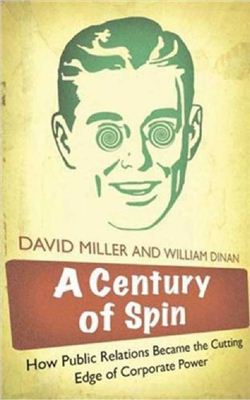Издательство Pluto Press, 2008, -240 pp.
public relations – propaganda – to secure their interests.
We argue that PR has played a very signifi cant role in the course of popular democracy over the last century. The powers of PR are not mysterious in the sense that they are magical or superhuman. They are all too human, the products of diligence, hard work, planning and conscious ideological warfare. They result in the institutional political corruption so obvious in neo-liberal societies, where govements are much more responsive to the conces of big business and the powerful than any other section of society. The result of corporate propaganda can be seen in the contemporary ‘common sense’ that what is good for business must be good for society. This kind of thinking is fostered as a means to protect the corporations and their allies from the possibility of democratic govement.
This book sets out to remove the shroud of mystery and show how and why public relations originated, how it is implicated in processes of globalisation, and most seriously, how it has aided and abetted the rise to power of the global corporations and the consequent withering of democracy. This book examines how, since the dawn of representative democracy, corporations and political elites have used public relations and lobbying to subvert and subdue democracy. It shows how every serious prospect of advancing democracy has met a backlash from corporations, hard at work trying to manage and manipulate public opinion, the media, policy makers and anything else that might stand in their way.
The Cutting Edge of Corporate Power
Public Relations: The Zelig Complex
The Hidden History of Corporate Propaganda, 1911–30 years
The Second Wave of Corporate Propaganda, 1936–50 years
The Case for Capitalism – the Third Wave, to the 1980s
The Real Rulers of the World
The Global PR Industry
Pulling Labour’s Teeth
Blair and the Business Lobby
Cameron and the Neo-cons
Corporate Propaganda and Power: The Manufacture of Compliance?
Appendix: Labour MPs’ Business Interests
public relations – propaganda – to secure their interests.
We argue that PR has played a very signifi cant role in the course of popular democracy over the last century. The powers of PR are not mysterious in the sense that they are magical or superhuman. They are all too human, the products of diligence, hard work, planning and conscious ideological warfare. They result in the institutional political corruption so obvious in neo-liberal societies, where govements are much more responsive to the conces of big business and the powerful than any other section of society. The result of corporate propaganda can be seen in the contemporary ‘common sense’ that what is good for business must be good for society. This kind of thinking is fostered as a means to protect the corporations and their allies from the possibility of democratic govement.
This book sets out to remove the shroud of mystery and show how and why public relations originated, how it is implicated in processes of globalisation, and most seriously, how it has aided and abetted the rise to power of the global corporations and the consequent withering of democracy. This book examines how, since the dawn of representative democracy, corporations and political elites have used public relations and lobbying to subvert and subdue democracy. It shows how every serious prospect of advancing democracy has met a backlash from corporations, hard at work trying to manage and manipulate public opinion, the media, policy makers and anything else that might stand in their way.
The Cutting Edge of Corporate Power
Public Relations: The Zelig Complex
The Hidden History of Corporate Propaganda, 1911–30 years
The Second Wave of Corporate Propaganda, 1936–50 years
The Case for Capitalism – the Third Wave, to the 1980s
The Real Rulers of the World
The Global PR Industry
Pulling Labour’s Teeth
Blair and the Business Lobby
Cameron and the Neo-cons
Corporate Propaganda and Power: The Manufacture of Compliance?
Appendix: Labour MPs’ Business Interests

